大一英语第一册翻译
大学英语(一)Unit1课文译文和练习
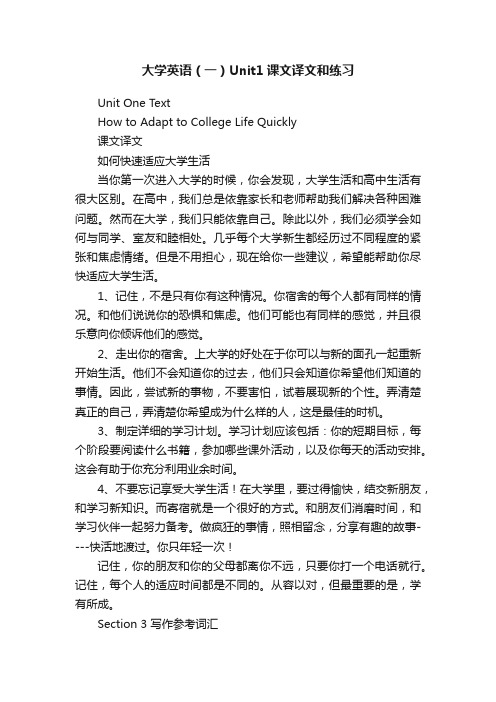
大学英语(一)Unit1课文译文和练习Unit One TextHow to Adapt to College Life Quickly课文译文如何快速适应大学生活当你第一次进入大学的时候,你会发现,大学生活和高中生活有很大区别。
在高中,我们总是依靠家长和老师帮助我们解决各种困难问题。
然而在大学,我们只能依靠自己。
除此以外,我们必须学会如何与同学、室友和睦相处。
几乎每个大学新生都经历过不同程度的紧张和焦虑情绪。
但是不用担心,现在给你一些建议,希望能帮助你尽快适应大学生活。
1、记住,不是只有你有这种情况。
你宿舍的每个人都有同样的情况。
和他们说说你的恐惧和焦虑。
他们可能也有同样的感觉,并且很乐意向你倾诉他们的感觉。
2、走出你的宿舍。
上大学的好处在于你可以与新的面孔一起重新开始生活。
他们不会知道你的过去,他们只会知道你希望他们知道的事情。
因此,尝试新的事物,不要害怕,试着展现新的个性。
弄清楚真正的自己,弄清楚你希望成为什么样的人,这是最佳的时机。
3、制定详细的学习计划。
学习计划应该包括:你的短期目标,每个阶段要阅读什么书籍,参加哪些课外活动,以及你每天的活动安排。
这会有助于你充分利用业余时间。
4、不要忘记享受大学生活!在大学里,要过得愉快,结交新朋友,和学习新知识。
而寄宿就是一个很好的方式。
和朋友们消磨时间,和学习伙伴一起努力备考。
做疯狂的事情,照相留念,分享有趣的故事----快活地渡过。
你只年轻一次!记住,你的朋友和你的父母都离你不远,只要你打一个电话就行。
记住,每个人的适应时间都是不同的。
从容以对,但最重要的是,学有所成。
Section 3 写作参考词汇faculty 学院department 系/部,institute 学院/研究院campus 校园,laboratory/lab 实验室auditorium 会堂/礼堂, gymnasium 体育馆/健身室information desk 咨询处library 图书馆art center 艺术中心clinic 医务室laundry room 洗衣室dining hall 食堂common room 公共休息室Administration Office 管理办公室computer center 计算机网络中心Student Accommodation Center 学生住宿管理中心audio-visual resource center 音像资料中心Law School 法学院Medical School 医学院Business School 商学院Faculty of EnglishLanguage and Culture英语语言文化学院Faculty of ElectronicEngineering电子工程学院Chemistry Department 化学系Faculty of Social Studies 社会学学院Mathematics Department 数学系Physics Department 物理系Physical Science Department自然科学系Management Institute管理学院Education Institute 教育学院Students’ Union学生会society社团registration form注册表membership application会员资格申请Recreation Center娱乐室Sports Hall 体育馆Activity Room 活动室playing fields 比赛场地tennis court 网球场football field 足球场volleyball 排球badminton 羽毛球racket 球拍Task 3 Give brief answers to the following questions. (p4)1. How do students solve all kinds of difficult problems at college?Students have to rely on themselves.2. How do most college freshmen feel when they first enter college?They experience some level of nervousness and anxiety.3. What does a detailed study plan usually include?It should include a student’s short-term goals, what books to read at a certain stage, what extra curriculum activities to participate in and daily activities.4. What is college about according to the passage?College is about having fun and making new friends as well as learning new knowledge.5. What could new students do when they are in need of help to adjust to the new environment?Just give a phone call to their friends and parents who are always ready to help.6. How do you adapt to your college life?OpenTask 6 Read the English sentences and translate the Chinesesentences into English.( P6)1. What's more, we should learn to live independently.What's more, we lack necessary experience.2. Chances are that man will eventually land on Mars.Chances are that Grace will not come to the meeting.3. For this reason, many of his former friends turned against him.For this reason, I have decided to take teaching as my future career.4. This is a great time not only to learn new knowledge but also to developourselves in all aspects.This is a great time not only to relax oneself but also to experience new things.5. Reading English aloud in the morning will do you a lot of good.Cheating in an exam ruins one's personality.Section 4 Activity 2 Task 1 (p14)1) This is my friend Mary. She is a student at Binhai Technical School.这是我们的新老师史密斯先生,他来自澳大利亚。
大学英语第一册课文翻译大学英语第一册课文unit1
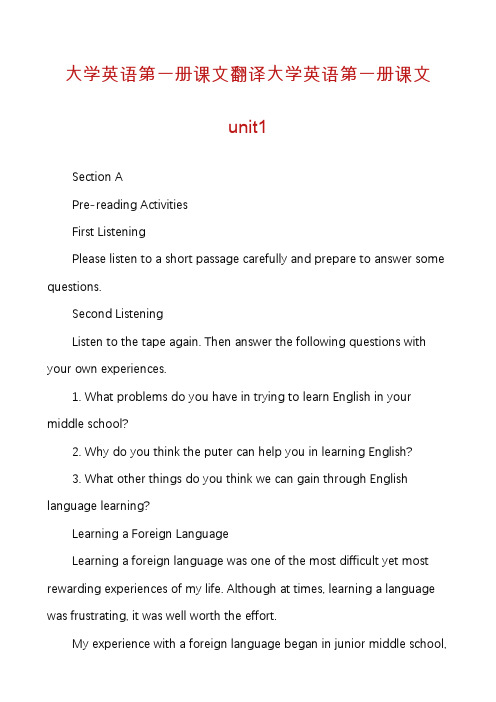
大学英语第一册课文翻译大学英语第一册课文unit1Section APre-reading ActivitiesFirst ListeningPlease listen to a short passage carefully and prepare to answer some questions.Second ListeningListen to the tape again. Then answer the following questions with your own experiences.1. What problems do you have in trying to learn English in your middle school?2. Why do you think the puter can help you in learning English?3. What other things do you think we can gain through English language learning?Learning a Foreign LanguageLearning a foreign language was one of the most difficult yet most rewarding experiences of my life. Although at times, learning a language was frustrating, it was well worth the effort.My experience with a foreign language began in junior middle school,when I took my first English class. I had a kind and patient teacher who often praised all of the students. Because of this positive method, I eagerly answered all the questions I could, never worrying much about making mistakes. I was at the top of my class for two years.When I went to senior middle school, I was eager to continue studying English; however, my experience in senior school was very different from before. While my former teacher had been patient with all the students, my new teacher quickly punished those who gave incorrect answers. Whenever we answered incorrectly, she pointed a long stick at us and, shaki ng it up and down, shouted, “No! No! No!" It didn't take me long to lose my eagerness to answer questions. Not only did I lose my joy in answering questions, but also I totally lost my desire to say anything at all in English.However, that state didn't last long. When I went to college, I learned that all students were required to take an English course. Unlike my senior middle school teacher, my college English teachers were patient and kind, and none of them carried long, pointed sticks! However, the situation was far from perfect. As our classes were very large, I was only able to answer a couple of questions in each class period. Also, after a few weeks of classes, I noticed there were many students who spoke much better than I did. I began to feel intimidated. So, once again, although for different reasons, I was afraid to speak. It seemed my English was going to stay at the samelevel forever.That was the situation until a couple of years later, when I was offered an opportunity to study English through an online course. The munication medium was a puter, phone line, and modem. I soon got access to the necessary equipment, learned the technology from a friend and participated in the virtual classroom 5 to 7 days a week.Online learning is not easier than regular classroom study; it requires much time, mitment and discipline to keep up with the flow of the course.I worked hard to meet the minimum standards set by the course and to plete assignments on time.I practiced all the time. I carried a little dictionary with me everywhere I went, as well as a notebook in which I listed any new words I heard. I made many, sometimes embarrassing, mistakes. Once in a while I cried with frustration, and sometimes I felt like giving up. But I didn't feel intimidated by students who spoke faster than I did because I took all the time I needed to think out my ideas and wrote a reply before posting it on the screen. Then, one day I realized I could understand just about everything I came across, and most importantly, I could "say" anything I wanted to in English. Although I still made many mistakes and was continually learning, I had finally reaped the benefits of all that hard work.Learning a foreign language has been a most trying experience for me, but one that I wouldn't trade for anything. Not only did learninganother language teach me the value of hard work, but it also gave me insights into another culture, and my mind was opened to new ways of seeing things. The most wonderful result of having learned a foreign language was that I could municate with many more people than before. Talking with people is one of my favorite activities, so being able to speak a new language lets me meet new people, participate in conversations, and form new, unforgettable friendships. Now that I speak a foreign language, instead of staring into space when English is being spoken, I can participate and make friends. I am able to reach out to others and bridge the gap between my language and culture and theirs.Section BKeys to Successful Online LearningWhile regular schools still exist, the virtual classroom plays an important role in today's learning munity. Job opportunities for students are expanding rapidly and more people of all ages are ing aware of online learning that allows them to study at home. Online students, however, require unique qualities to be successful. The following list discusses some ideal qualities of successful online students.1. Be open-minded about sharing life, work, and learning experiences as part of online learning.Many different people find that the online method requires them to use their experiences and that online learning offers them a place tomunicate with each other. This forum for munication removes the visual barriers that hinder some students from expressing themselves. In addition, students are given time to reflect on the information before replying. In this way, students can help to keep the online environment open and friendly.2. Be able to municate through writing.In the virtual classroom nearly all munication is written, so it is critical that students feel fortable expressing themselves in writing. Some students have limited writing abilities which need to be improved before or as part of the online experience. This usually requires extra mitment by these students. Whether working alone or in a group, students share ideas, perspectives and discussions on the subject being studied, and read about those of their classmates. In this way, students gain great insight from their peers, learning from each other as well as the instructor.3. Be willing to "speak up" if problems arise.Remember that instructors cannot see their students in an online course. This means students must be absolutely explicit with their ments and requests. If they experience technical difficulties, or problems in understanding something about the course, they MUST speak up; otherwise there is no way anyone can know something is wrong. If one person does not understand something, possibly several others have the same problem. If another student is able to help, she/he probably will.While explaining something to others, students reinforce their own knowledge about the subject.4. Take the program seriously.Online learning is not easier than study in regular classrooms. In fact, many students say it requires much more time and effort. Requirements for online courses are not less than those of any quality program. Successful students, however, see online learning as a convenient way to receive their education — not an easier way. Many online students sit at puters for hours at a time during evenings and on weekends in order to plete their assignments. When other people are finished and having fun is most likely the time when online students do their course work. Online students need to mit 4 to 15 hours a week for each course.5. Accept critical thinking and decision making as part of online learning.Online courses require students to make decisions based on facts as well as experience. It is absolutely necessary for students to assimilate information and make the right decisions based on critical thinking. In a positive online environment, students feel valued by the instructor, by their classmates and by their own work.6. Be able to think ideas through before replying.Providing meaningful and quality input into the virtual classroom is an essential part of online learning. Time is given to allow for carefuldevelopment of answers. Testing and challenging of ideas is encouraged. Many times online students will not always be right; they just need to be prepared to accept a challenge.7. Keep up with the progress of the course.Online learning is normally sequential and requires mitment on the students' part. Keeping up with the face-to-face class and pleting all work on time is vital. Once students get behind, it is almost impossible to catch up. Students need to want to be there and need to want the experience. The instructor may have to municate with students personally to offer help and remind them of the need to keep up.Just as many excellent instructors may not be effective online facilitators, not all students have the necessary qualities to perform well online. People who have the qualities discussed above usually make very successful online students. If you have these qualities, learning online may be one of the best discoveries you will ever make.Section CTeaching Children at HomeRecord numbers of children are being taken out of school and taught by their parents at home. Up to 100 children a month are leaving the classroom because parents are not satisfied with schools. Around 15,000 families now teach their children at home, a rise of 50 per cent from last year, according to the latest figures.This present rise in home schooling is blamed on the nature of examinations, not getting children into the school of choice, and dissatisfaction with teaching methods. Some parents prefer keeping children home because of attacks by other students and a lack of discipline in schools. Researchers say, however, many families prefer teaching at home because they feel the idea of public schooling is not modern. They believe schools will be things of the past in 20 years as media technology, like the Internet, teaches children. 1. ______Under the law, parents must teach their children, whether at school or at home. Community officials are charged with protecting their schooling. Professor Meighan of Nottingham University says parents were fed up with the requirements of existing schools. For him, schools are an out-of-date concept from the days of the town crier(市政传令员), when it was difficult to get information and a central person was needed to municate knowledge. He also thinks parents are recognizing education is moving on and don't want their children to be held back by out-of-date methods. 2. ______Meighan suggests children will be taught at home using the Internet, puters, and video(录像片). He thinks future schools will be small groups of children, sharing equipment in their homes. The teachers may e advisers who sort through the information. 3. ______Future schooling was questioned by Sir Christopher Ball of the Royal(皇家的)Society of Arts. He thinks learning in the future will include an international curriculum and international standards. He sees some present models of schooling — munity schools and home schooling, for example — ing more central and other models, not yet existing, may develop. 4.______How Personal Choice Brings O-Level Success at 13Leslie Barson is already running the type of school that researchers think will teach children in the future. Based partly at a munity centre and partly in family homes, the Otherwise Club includes some 35 families around north London. Professional teachers are brought in to help with special subjects, but mostly parents and children work together on units like studying the Greeks or the American Civil War, reading about events, making costumes(戏装), and learning how people used to live. 5.______ 6. ______Parents choosing home schooling say the freedom of home learning allows some children to sit one or two GCEs by the age of 13. Ms. Barson's own children, Luis, age 12, and 7-year-old Lilly, have never attended school. She pays around 2,000 pounds a year for private teachers to help in special areas. She set up the Otherwise Club six years ago with just a few students. She thinks the purpose of teaching children is to develop their self-worth. Her son agrees. Luis, now teaching himself math, said, "I like the freedom to learn things that interest me, especially music. I don't feel Iam missing out on anything by not being at school because I am a member of various clubs and have friends who attend normal school." 7. ______ 8. ______The “Danger” of Separating StudentsHome schooling could change children's relations with their peers and older people because of long periods spent with their parents. Most professors agree future learning will be more centred around the home, and fear children could e isolated and shy. Professor Michael Barber of London University said pupils could spend half their time at school, half at home as a way to solve this problem. He believes very strongly that children need the experience of school to ensure the quality of being taught the basics and being examined. He thinks children must spend time with peers to learn the rules of work in a democratic(民主的)society and to learn how to deal with relations with more people than just their parents. Margaret Rudland, head teacher in Hammersmith, also thinks children must experience actual peer relations. 9. ______ 10. ______。
新标准大学英语1课后翻译

新标准大学英语1课后翻译Unit 1 Friendship。
Part I。
1. 我有一个好朋友,她叫玛丽。
她是一个非常聪明和有趣的女孩。
I have a good friend, her name is Mary. She is a very smart and interesting girl.2. 我们经常一起上学,一起吃午饭,一起做作业。
We often go to school together, have lunch together, and do homework together.3. 玛丽是一个很好的倾听者,她总是在我需要的时候给我建议。
Mary is a good listener, she always gives me advice when I need it.4. 我们经常分享彼此的快乐和痛苦,这让我们的友谊更加牢固。
We often share our joys and sorrows, which makes our friendship stronger.5. 有时候我们也会有争吵,但是我们总是很快就和好了。
Sometimes we argue, but we always make up quickly.Part II。
1. 我们的友谊是建立在信任和理解的基础上的。
Our friendship is based on trust and understanding.2. 无论发生什么事情,我们都会互相支持和鼓励。
No matter what happens, we always support and encourage each other.3. 我相信这样的友谊会一直持续下去。
I believe that this kind of friendship will last forever.4. 我们经常一起度过美好的时光,这让我们的大学生活变得更加丰富多彩。
大一综合英语1课文翻译

我的第一份工作在宾夕法尼亚州的夏洛瑞市,我的父母经营着一家小餐馆——潘格尼斯餐馆。
餐馆每周营业七天,每天24小时。
我的第一份正式工作是给顾客擦鞋,那时我六岁。
父亲年轻时也曾干过这活,所以他就教我怎样把鞋擦好,还让我问问顾客活干得好不好,如果顾客不满意,应主动给顾客再擦一次。
随着年龄的增长,我的活也多了起来。
十岁时,我已经会收拾餐桌了,并且还当清洁工。
爸爸咧着嘴笑着说我是在他手下干过的最好的“清洁工”。
在餐馆里工作是我骄傲的资本,因为我也在为家里的生计出把力。
但是,父亲明确规定我得符合一定的标准才能成为集体的一员。
我必须守时,勤快,对顾客彬彬有礼。
在餐馆里除了擦鞋以外,其它工作都没有报酬。
一天我犯了个错误,告诉父亲我觉得他每周应付我10美元的报酬。
父亲说:“好呀,那你付我在这儿的一日三餐钱,怎么样?还有你带你的朋友来免费喝饮料的钱?”他算下来我每周还欠他40美元。
这件事情给了我一个教训:在谈判时,你不仅要知道自己想说什么,你还要搞清楚对方会说些什么。
我还记得在外服兵役两年后回家的情景。
我刚晋升为上尉,满脸自豪地迈进父母的餐馆。
父亲的第一句话就是:“今天清洁工休息,晚上你来打扫卫生,怎么样?”我简直不敢相信!我想,我是一名美国陆军军官!但这并不要紧。
在父亲的眼里我只是团队中的一名成员。
我伸手去拿了拖把。
为父亲做事使我明白了一个道理,对团队的忠诚是第一位的,无论这个团队从事的是经营家庭餐馆还是执行“沙漠风暴行动”。
我的第一份工作“做什么事都要有自豪感,”父亲总是这样告诉我,“不管你是老板还是清洁工。
” 15岁时我在一家地方医院有了份兼职工作,他们要我做拖地的活儿。
我笑了,就想到了父亲说过的那些话。
既使我的工作是最低层的,我也非常激动能有事情做。
我没把它看成是个困难,而是看成一个挑战,因为这是我的第一份工作。
我学着去守时,符合工作规范。
反过来,医院里的职工和病人也很尊敬我。
每天早晨,我先设想一下,如果我没能洗涮干净,那沾满麦片粥的碟子只能让病人更感不适。
大学英语第一册课文翻译
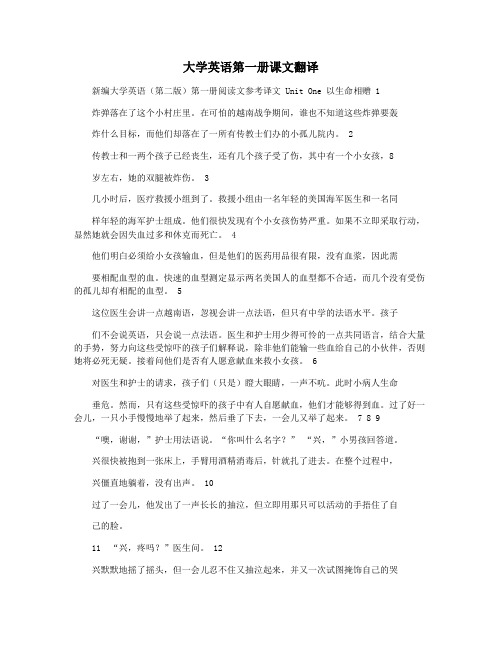
大学英语第一册课文翻译新编大学英语(第二版)第一册阅读文参考译文 Unit One 以生命相赠 1炸弹落在了这个小村庄里。
在可怕的越南战争期间,谁也不知道这些炸弹要轰炸什么目标,而他们却落在了一所有传教士们办的小孤儿院内。
2传教士和一两个孩子已经丧生,还有几个孩子受了伤,其中有一个小女孩,8岁左右,她的双腿被炸伤。
3几小时后,医疗救援小组到了。
救援小组由一名年轻的美国海军医生和一名同样年轻的海军护士组成。
他们很快发现有个小女孩伤势严重。
如果不立即采取行动,显然她就会因失血过多和休克而死亡。
4他们明白必须给小女孩输血,但是他们的医药用品很有限,没有血浆,因此需要相配血型的血。
快速的血型测定显示两名美国人的血型都不合适,而几个没有受伤的孤儿却有相配的血型。
5这位医生会讲一点越南语,忽视会讲一点法语,但只有中学的法语水平。
孩子们不会说英语,只会说一点法语。
医生和护士用少得可怜的一点共同语言,结合大量的手势,努力向这些受惊吓的孩子们解释说,除非他们能输一些血给自己的小伙伴,否则她将必死无疑。
接着问他们是否有人愿意献血来救小女孩。
6对医生和护士的请求,孩子们(只是)瞪大眼睛,一声不吭。
此时小病人生命垂危。
然而,只有这些受惊吓的孩子中有人自愿献血,他们才能够得到血。
过了好一会儿,一只小手慢慢地举了起来,然后垂了下去,一会儿又举了起来。
7 8 9“噢,谢谢,”护士用法语说。
“你叫什么名字?” “兴,”小男孩回答道。
兴很快被抱到一张床上,手臂用酒精消毒后,针就扎了进去。
在整个过程中,兴僵直地躺着,没有出声。
10过了一会儿,他发出了一声长长的抽泣,但立即用那只可以活动的手捂住了自己的脸。
11 “兴,疼吗?”医生问。
12兴默默地摇了摇头,但一会儿忍不住又抽泣起来,并又一次试图掩饰自己的哭声。
医生又问是不是插在手臂上的针弄疼了他,兴又摇了摇头。
13 但现在,偶尔的抽泣变成了持续无声的哭泣。
他紧紧地闭着眼睛,用拳头堵住嘴想竭力忍住哭泣。
大学生英语第一册翻译
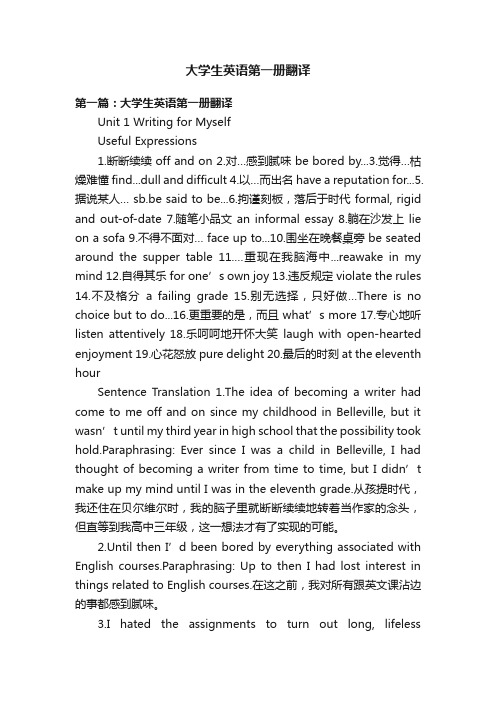
大学生英语第一册翻译第一篇:大学生英语第一册翻译Unit 1 Writing for MyselfUseful Expressions1.断断续续 off and on2.对…感到腻味 be bored by...3.觉得…枯燥难懂 find...dull and difficult4.以…而出名have a reputation for...5.据说某人… sb.be said to be...6.拘谨刻板,落后于时代 formal, rigid and out-of-date7.随笔小品文an informal essay8.躺在沙发上lie on a sofa9.不得不面对… face up to...10.围坐在晚餐桌旁 be seated around the supper table 11.…重现在我脑海中...reawake in my mind 12.自得其乐for one’s own joy 13.违反规定 violate the rules 14.不及格分a failing grade 15.别无选择,只好做…There is no choice but to do...16.更重要的是,而且what’s more 17.专心地听listen attentively 18.乐呵呵地开怀大笑laugh with open-hearted enjoyment 19.心花怒放pure delight 20.最后的时刻 at the eleventh hourSentence Translation 1.The idea of becoming a writer had come to me off and on since my childhood in Belleville, but it wasn’t until my third year in high school that the possibility took hold.Paraphrasing: Ever since I was a child in Belleville, I had thought of becoming a writer from time to time, but I didn’t make up my mind until I was in the eleventh grade.从孩提时代,我还住在贝尔维尔时,我的脑子里就断断续续地转着当作家的念头,但直等到我高中三年级,这一想法才有了实现的可能。
大一上学期英语翻译
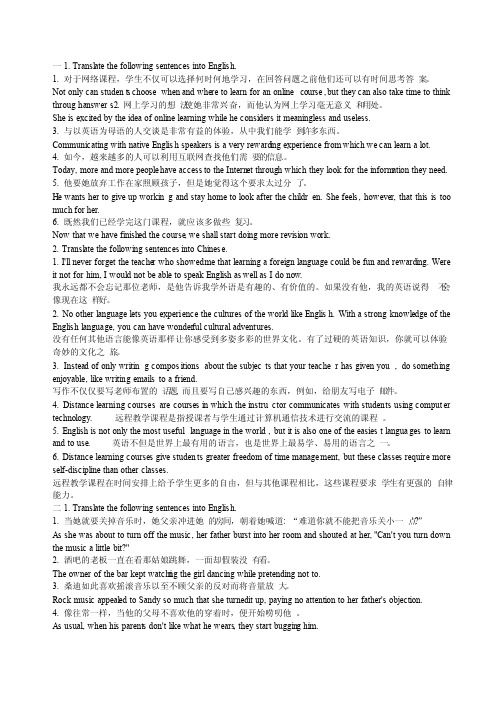
一1. Transla te the followi ng sentenc es into English.1. 对于网络课程,学生不仅可以选择何时何地学习,在回答问题之前他们还可以有时间思考答案。
Not only can student s choose when and where to learn for an onlinecourse, but they can also take time to think through answers 2. 网上学习的想法使她非常兴奋,而他认为网上学习毫无意义和用处。
She is excited by the idea of onlinelearnin g while he conside rs it meaning less and useless.3. 与以英语为母语的人交谈是非常有益的体验,从中我们能学到许多东西。
Communi cating with nativeEnglish speaker s is a very rewardi ng experie nce from which we can learn a lot.4. 如今,越来越多的人可以利用互联网查找他们需要的信息。
Today, more and more peoplehave accessto the Interne t through which they look for the informa tion they need.5. 他要她放弃工作在家照顾孩子,但是她觉得这个要求太过分了。
He wants her to give up working and stay home to look after the childre n. She feels, however, that this is too much for her.6. 既然我们已经学完这门课程,就应该多做些复习。
全新版大学英语大一综合教程1课文翻译Unit-1-6及课后练习翻译题答案

全新版大学英语大一综合教程1课文翻译Unit-1-6及课后练习翻译题答案Unit 1The idea of becoming a writer had come to me off and on since my childhood in Belleville, but it wasn't until my third year in high school that the possibility took hold.从孩提时代,我还住在贝尔维尔时,我的脑子里就断断续续地转着当作家的念头,但直等到我高中三年级,这—想法才有了实现的可能。
Lying on the sofa, I finally faced up to the unwelcome task, took the list out of my notebook, and scanned it. The topic on which my eye stopped was “The Art of Eating Spaghetti.”我躺在沙发上,最终不得不面对这一讨厌的功课,便从笔记本里抽出作文题目单粗粗……看。
我的目光落在“吃意大利细面条的艺术”这个题目上。
When I finished it the night was half gone and there was no time left to compose a proper, respectable essay for Mr. Fleagle.等我写完时已是半夜时分,再没时间为弗利格尔先生写一篇循规蹈矩、像模像样的文章了。
I did my best to avoid showing pleasure, but what I was feeling was pure delight at this demonstration that my words had the power to make people laugh.我尽力不流露出得意的心情,但是看到我写的文章竟然能使别人大笑,我真是心花怒放。
大学英语教材1课文翻译
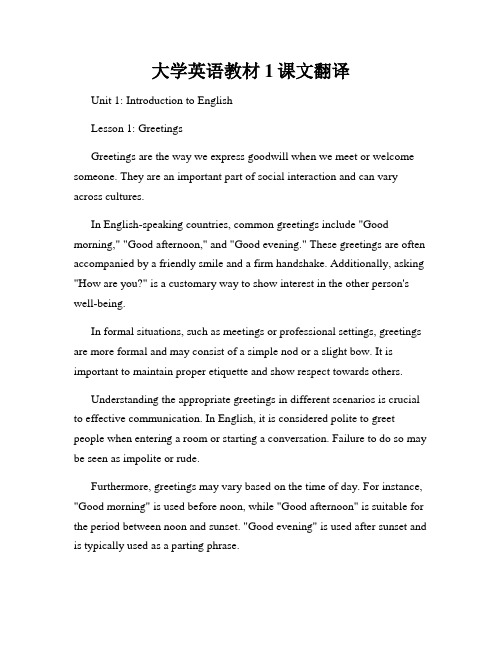
大学英语教材1课文翻译Unit 1: Introduction to EnglishLesson 1: GreetingsGreetings are the way we express goodwill when we meet or welcome someone. They are an important part of social interaction and can vary across cultures.In English-speaking countries, common greetings include "Good morning," "Good afternoon," and "Good evening." These greetings are often accompanied by a friendly smile and a firm handshake. Additionally, asking "How are you?" is a customary way to show interest in the other person's well-being.In formal situations, such as meetings or professional settings, greetings are more formal and may consist of a simple nod or a slight bow. It is important to maintain proper etiquette and show respect towards others.Understanding the appropriate greetings in different scenarios is crucial to effective communication. In English, it is considered polite to greet people when entering a room or starting a conversation. Failure to do so may be seen as impolite or rude.Furthermore, greetings may vary based on the time of day. For instance, "Good morning" is used before noon, while "Good afternoon" is suitable for the period between noon and sunset. "Good evening" is used after sunset and is typically used as a parting phrase.Learning greetings is one of the first steps in mastering a language. It not only helps you initiate conversations but also portrays your interest in others. By understanding and using appropriate greetings, you can create a positive impression and build rapport with people from different backgrounds.In conclusion, greetings play a significant role in social interactions and communication. They reflect cultural norms and contribute to establishing connections. Regardless of the language, greetings serve as a bridge between individuals, fostering mutual understanding and respect.。
新标准大学英语1课文翻译
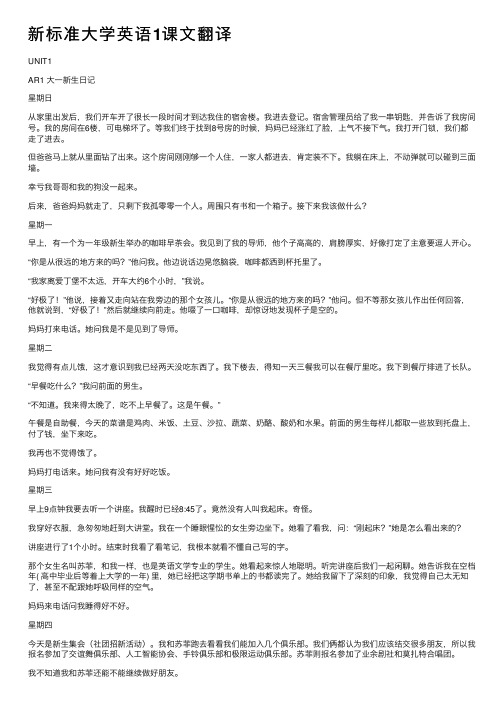
新标准⼤学英语1课⽂翻译UNIT1AR1 ⼤⼀新⽣⽇记星期⽇从家⾥出发后,我们开车开了很长⼀段时间才到达我住的宿舍楼。
我进去登记。
宿舍管理员给了我⼀串钥匙,并告诉了我房间号。
我的房间在6楼,可电梯坏了。
等我们终于找到8号房的时候,妈妈已经涨红了脸,上⽓不接下⽓。
我打开门锁,我们都⾛了进去。
但爸爸马上就从⾥⾯钻了出来。
这个房间刚刚够⼀个⼈住,⼀家⼈都进去,肯定装不下。
我躺在床上,不动弹就可以碰到三⾯墙。
幸亏我哥哥和我的狗没⼀起来。
后来,爸爸妈妈就⾛了,只剩下我孤零零⼀个⼈。
周围只有书和⼀个箱⼦。
接下来我该做什么?星期⼀早上,有⼀个为⼀年级新⽣举办的咖啡早茶会。
我见到了我的导师,他个⼦⾼⾼的,肩膀厚实,好像打定了主意要逗⼈开⼼。
“你是从很远的地⽅来的吗?”他问我。
他边说话边晃悠脑袋,咖啡都洒到杯托⾥了。
“我家离爱丁堡不太远,开车⼤约6个⼩时,”我说。
“好极了!”他说,接着⼜⾛向站在我旁边的那个⼥孩⼉。
“你是从很远的地⽅来的吗?”他问。
但不等那⼥孩⼉作出任何回答,他就说到,“好极了!”然后就继续向前⾛。
他啜了⼀⼝咖啡,却惊讶地发现杯⼦是空的。
妈妈打来电话。
她问我是不是见到了导师。
星期⼆我觉得有点⼉饿,这才意识到我已经两天没吃东西了。
我下楼去,得知⼀天三餐我可以在餐厅⾥吃。
我下到餐厅排进了长队。
“早餐吃什么?”我问前⾯的男⽣。
“不知道。
我来得太晚了,吃不上早餐了。
这是午餐。
”午餐是⾃助餐,今天的菜谱是鸡⾁、⽶饭、⼟⾖、沙拉、蔬菜、奶酪、酸奶和⽔果。
前⾯的男⽣每样⼉都取⼀些放到托盘上,付了钱,坐下来吃。
我再也不觉得饿了。
妈妈打电话来。
她问我有没有好好吃饭。
星期三早上9点钟我要去听⼀个讲座。
我醒时已经8:45了。
竟然没有⼈叫我起床。
奇怪。
我穿好⾐服,急匆匆地赶到⼤讲堂。
我在⼀个睡眼惺忪的⼥⽣旁边坐下。
她看了看我,问:“刚起床?”她是怎么看出来的?讲座进⾏了1个⼩时。
结束时我看了看笔记,我根本就看不懂⾃⼰写的字。
大学一年级英语教材翻译
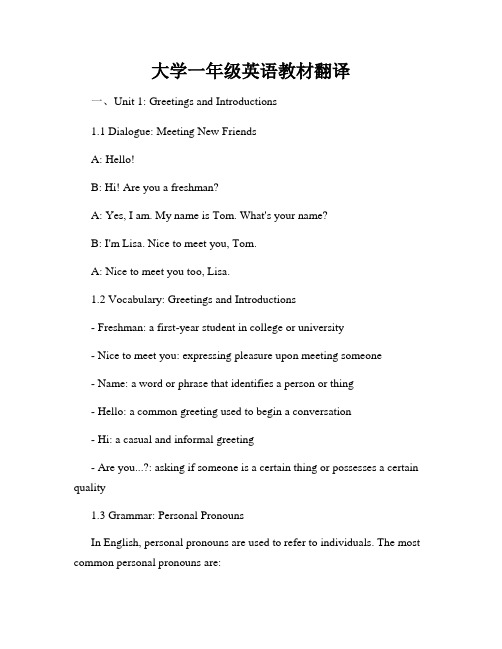
大学一年级英语教材翻译一、Unit 1: Greetings and Introductions1.1 Dialogue: Meeting New FriendsA: Hello!B: Hi! Are you a freshman?A: Yes, I am. My name is Tom. What's your name?B: I'm Lisa. Nice to meet you, Tom.A: Nice to meet you too, Lisa.1.2 Vocabulary: Greetings and Introductions- Freshman: a first-year student in college or university- Nice to meet you: expressing pleasure upon meeting someone- Name: a word or phrase that identifies a person or thing- Hello: a common greeting used to begin a conversation- Hi: a casual and informal greeting- Are you...?: asking if someone is a certain thing or possesses a certain quality1.3 Grammar: Personal PronounsIn English, personal pronouns are used to refer to individuals. The most common personal pronouns are:- I: used when referring to oneself as the subject of a sentence- You: used when referring to the person(s) being spoken to- He/She/It: used when referring to someone or something that is not the speaker or the person(s) being spoken to- We: used when referring to oneself and at least one other person as the subject of a sentence- They: used when referring to more than one person or thing as the subject of a sentence1.4 Exercise: Greetings and IntroductionsComplete the following dialogue using appropriate greetings and introductions:A: ______________B: Hi! Yes, I am. My name is Emily. What's _________?A: ____________, Emily. Nice to meet you.B: _______________.二、Unit 2: Daily Routines2.1 Dialogue: A Typical DayA: What time do you usually wake up?B: I usually wake up at 7 o'clock in the morning. How about you?A: I wake up at 6:30. Then, I take a shower and have breakfast.2.2 Vocabulary: Daily Routines- Wake up: stop sleeping and become conscious- Usually: happening or done on most occasions- Morning: the period of time between midnight and noon- Take a shower: clean the body using water and soap- Breakfast: the first meal of the day, usually eaten in the morning2.3 Grammar: Present Simple TenseThe present simple tense is used to describe habitual actions or general truths. It is formed by using the base form of the verb (without any suffix) for all pronouns:- I/You/We/They wake up early.- He/She/It wakes up early.2.4 Exercise: Daily RoutinesComplete the following sentences using the present simple tense:- She ____________ (go) to the gym every morning.- We ____________ (study) English on weekdays.- They ____________ (have) dinner at 7 o'clock.三、Unit 3: Family3.1 Dialogue: Family IntroductionA: Who is that woman in the picture?B: That's my mother. Her name is Jane. And the man next to her is my father, John.3.2 Vocabulary: Family Members- Mother: a female parent- Father: a male parent- Woman: an adult female human- Man: an adult male human- Picture: a visual representation of something or someone3.3 Grammar: Possessive PronounsPossessive pronouns are used to indicate ownership or possession. The possessive pronouns in English are:- My: belonging to the speaker- Your: belonging to the person(s) being spoken to- His/Her/Its: belonging to someone or something that is not the speaker or the person(s) being spoken to- Our: belonging to the speaker and at least one other person- Their: belonging to more than one person or thing3.4 Exercise: Family MembersComplete the following sentences using appropriate possessive pronouns:- This is _______________ (book).- _______________ (parents) are teachers.- Can I borrow _______________ (pen)?四、Unit 4: At the Restaurant4.1 Dialogue: Ordering FoodA: Good evening! Are you ready to order?B: Yes, I'll have a chicken sandwich and a cola, please.4.2 Vocabulary: Food and Beverages- Restaurant: a place where people can dine and order food- Order: request particular food or drink to be served- Chicken sandwich: a sandwich filled with chicken meat- Cola: a carbonated soft drink4.3 Grammar: Modal Verb "Will"The modal verb "will" is used to express future actions or intentions. It is often used when making decisions or offering assistance:- I will visit my grandparents tomorrow.- Will you help me carry these bags?4.4 Exercise: Ordering FoodComplete the following sentences using the modal verb "will":- I _____________ (buy) some fruits at the market later.- _____________ (you) pass me the salt, please?- We _____________ (have) a party next week.注:以上文字仅用于演示翻译需求,具体内容仅属示例,并非真实的教材翻译。
大学英语第一册课后翻译

大学英语第一册课后翻译Unit 11. When I knew the details I realized that I should not have lost my temper in the office.2. I don’t / didn’t know Bob very well, but we go / went out for an occasional drink together.3. The meeting is supposed to take place on Tuesday, but we have to postpone it / put it off.4. Our government took action to bring / get all the Chinese in that country back to China.5. Including weekends, there are only 12 more days to buy Christmas presents / gifts.6 .Without immediate action, many kinds / species of wild animals would die from hunger.Unit 31. You won’t get the job unless you’ve got the experience.2. I spent most of my time studying the differences betweenChinese and American cultures.3. The statement is so clear that it can’t cause any misunderstanding.4. He wishes he could give her more help than he does.5. Remember to invite her to the birthday party, or she would complain.6. “You have to add $2,500 for equipment purchase / buying equipment to the cost,” said the director.7. It is important to be aware of your strengths and weaknesses and the environment you are in.8. You will soon find yourself without any friends at all if you keep on being so rude to everybody.Unit 41 The individuals who have contributed are far too many / numerous to mention.2 The noise woke us up in the middle of the night.3 He shouldn’t have been angry at what I said. It was nothing more than a joke.4 We invited all our friends to the picnic, but it rained and only five of them showed up.5 Marriage is viewed as a serious matter.6 To my disappointment, the movie didn’t live up to my expectations.Unit 71.My friend said she would consider making a donation tothe school.2.I suggest he think carefully about it before he makes anydecisions.3.John is likely to come to the party tomorrow.4.It is not enough to have only theoretical knowledge. We shouldlearn how to put theory into practice.5.You shoul dn’t have gone back to the burning building- you mighthave been badly\seriously burned.6.It had never crossed my mind that there might be a problem.7.Charles is shy and does not take the initiative in making friends.Unit 81.Lengthy negotiations must take place before any agreement can bereached.2.A computer can store a great deal of information.3.By the age of 24, the young man had made himself CEO ofa largecompany.4.The teacher knows all his students by name.5.The police have finally succeeded in solving the mystery.6.He likes all kinds of sports, but most of all, basketball.7.He is eager to meet his favorite pop star face to face.8.They fell in love with each other because they had commoninterests.Unit 91.The topic of the speech was announced a week in advance, but thename of the speaker was not.2.It seemed incredible that some students played football just beforethe exams.3.Mr. Auden is a happy man, who derives pleasure from helpingothers.4.Most people are aware of/ have realized the need to reduce energyconsumption.5.First of all, you must have clear goals and then a practical/feasibleplan.6.I’m not accustomed to such luxury. It’s a waste of money.7.The results of the exam will be put up on Friday afternoon.8.Some cruel experiments on animals are carried out in thename ofscience.。
大学英语1课文翻译
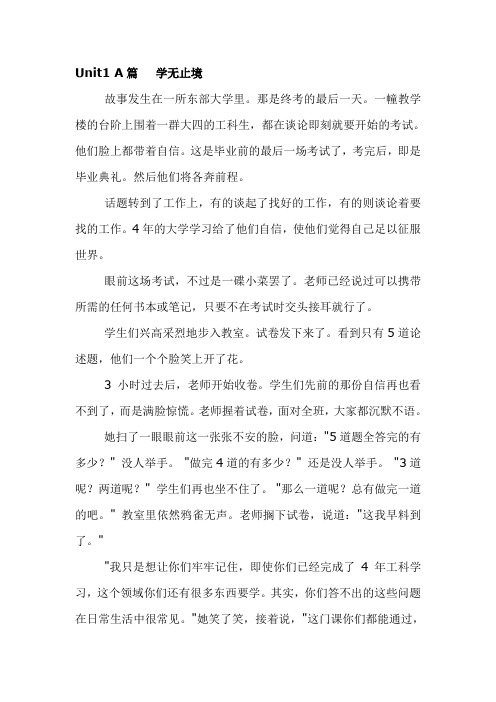
Unit1 A篇学无止境故事发生在一所东部大学里。
那是终考的最后一天。
一幢教学楼的台阶上围着一群大四的工科生,都在谈论即刻就要开始的考试。
他们脸上都带着自信。
这是毕业前的最后一场考试了,考完后,即是毕业典礼。
然后他们将各奔前程。
话题转到了工作上,有的谈起了找好的工作,有的则谈论着要找的工作。
4年的大学学习给了他们自信,使他们觉得自己足以征服世界。
眼前这场考试,不过是一碟小菜罢了。
老师已经说过可以携带所需的任何书本或笔记,只要不在考试时交头接耳就行了。
学生们兴高采烈地步入教室。
试卷发下来了。
看到只有5道论述题,他们一个个脸笑上开了花。
3小时过去后,老师开始收卷。
学生们先前的那份自信再也看不到了,而是满脸惊慌。
老师握着试卷,面对全班,大家都沉默不语。
她扫了一眼眼前这一张张不安的脸,问道:"5道题全答完的有多少?" 没人举手。
"做完4道的有多少?" 还是没人举手。
"3道呢?两道呢?" 学生们再也坐不住了。
"那么一道呢?总有做完一道的吧。
" 教室里依然鸦雀无声。
老师搁下试卷,说道:"这我早料到了。
""我只是想让你们牢牢记住,即使你们已经完成了4年工科学习,这个领域你们还有很多东西要学。
其实,你们答不出的这些问题在日常生活中很常见。
"她笑了笑,接着说,"这门课你们都能通过,但要记住,你们虽然已经大学毕业,但学习才刚刚开始。
"多年后,我已忘了这位老师的姓名,但牢牢记住了她的教诲。
B篇回眸大学4年的时光已经过去,这一刻终于来临了。
不到两周,我就要毕业了。
此刻回想起来,我仍不敢相信时光飞逝如斯。
我依然记得第一天去上课时的情景,我一边望着课表背面的地图,一边打听教学楼在哪儿。
现在我已是大四的学生,常会以羡慕的眼光看着一年级的新生。
每天我都祈愿时间会凝滞,接下来的两周过得更慢一些。
大一英语句子翻译及答案
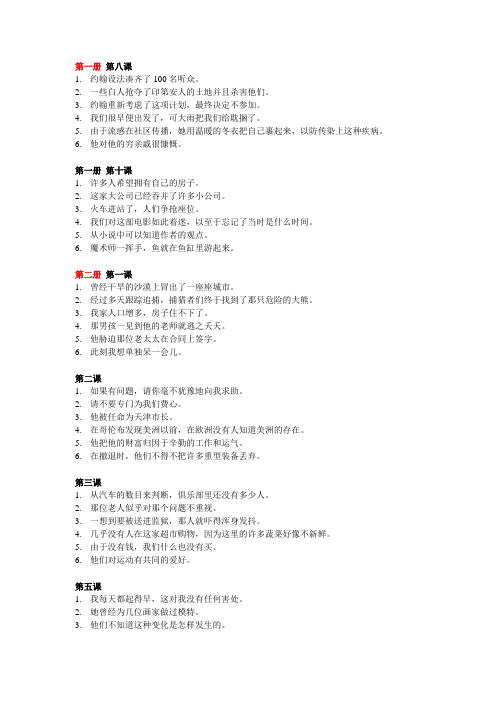
第一册第八课1.约翰设法凑齐了100名听众。
2.一些白人抢夺了印第安人的土地并且杀害他们。
3.约翰重新考虑了这项计划,最终决定不参加。
4.我们很早便出发了,可大雨把我们给耽搁了。
5.由于流感在社区传播,她用温暖的冬衣把自己裹起来,以防传染上这种疾病。
6.他对他的穷亲戚很慷慨。
第一册第十课1.许多人希望拥有自己的房子。
2.这家大公司已经吞并了许多小公司。
3.火车进站了,人们争抢座位。
4.我们对这部电影如此着迷,以至于忘记了当时是什么时间。
5.从小说中可以知道作者的观点。
6.魔术师一挥手,鱼就在鱼缸里游起来。
第二册第一课1.曾经干旱的沙漠上冒出了一座座城市。
2.经过多天跟踪追捕,捕猎者们终于找到了那只危险的大熊。
3.我家人口增多,房子住不下了。
4.那男孩一见到他的老师就逃之夭夭。
5.他胁迫那位老太太在合同上签字。
6.此刻我想单独呆一会儿。
第二课1.如果有问题,请你毫不犹豫地向我求助。
2.请不要专门为我们费心。
3.他被任命为天津市长。
4.在哥伦布发现美洲以前,在欧洲没有人知道美洲的存在。
5.他把他的财富归因于辛勤的工作和运气。
6.在撤退时,他们不得不把许多重型装备丢弃。
第三课1.从汽车的数目来判断,俱乐部里还没有多少人。
2.那位老人似乎对那个问题不重视。
3.一想到要被送进监狱,那人就吓得浑身发抖。
4.几乎没有人在这家超市购物,因为这里的许多蔬菜好像不新鲜。
5.由于没有钱,我们什么也没有买。
6.他们对运动有共同的爱好。
第五课1.我每天都起得早,这对我没有任何害处。
2.她曾经为几位画家做过模特。
3.他们不知道这种变化是怎样发生的。
4.现在家庭收入消减了三分之一多。
5.穆斯林占这个国家人口的65%。
6.她要我戒烟,因为她不喜欢烟味。
第六课1.我这一天真是难受,什么都不顺。
2.校长没完没了地谈论交通安全。
3.你得接受新的税法,乐不乐意可由不得你。
4.孩子太多了,艾丽丝要管住他们很费劲。
5.我们很可能要离开一个月。
大一英语第一册翻译
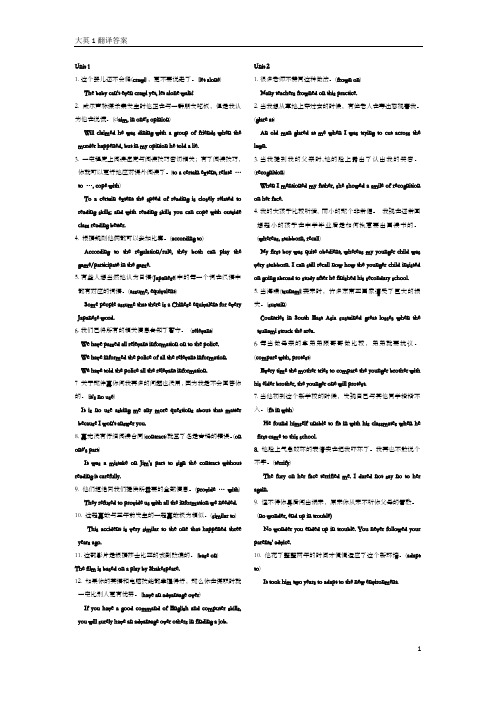
1.这个婴儿还不会爬(crawl),更不要说走了。
(let alone)The baby can't even crawl yet, let alone walk!2. 威尔声称谋杀案发生时他正在与一群朋友吃饭,但是我认为他在说谎。
(cl aim, in one's opinion)Will claimed he was dining with a group of friends when the murder happened, but in my opinion he told a lie.3. 一定程度上阅读速度与阅读技巧密切相关;有了阅读技巧,你就可以更好地应对课外阅读了。
(to a certain extent, relate …to …, cope with)To a certain extent the speed of reading is closely related to reading skills; and with reading skills you can cope with outside class reading better.4. 根据规则他俩都可以参加比赛。
(according to)According to the regulation/rule, they both can play the game/participate in the game.5.有些人想当然地认为日语(Japanese)中的每一个词在汉语中都有对应的词语。
(assume, equivalent)Some people assume that there is a Chinese equivalent for every Japanese word.6.我们已将所有的相关信息告知了警方。
(relevant)We have passed all relevant information on to the police.We have informed the police of all the relevant information.We have told the police all the relevant information.7 关于那件事你问我再多的问题也没用,因为我是不会回答你的。
大学大一英语教材翻译

大学大一英语教材翻译Translation of First-Year College English TextbookIntroduction:概述:As the first-year college English textbook, this material aims to provide a comprehensive foundation for students' English language skills. It covers various aspects of English, including grammar, vocabulary, reading comprehension, writing, and speaking. The textbook adopts a communicative approach and incorporates interactive activities to enhance students' English proficiency and understanding of Western culture. In this translation, we will discuss the key characteristics and contents of the textbook.I. Unit 1: Introduction to English Language and Culture第一单元:英语语言与文化概述Unit 1 introduces students to the English language and its cultural significance. It covers the history of English, its development, and its global spread. The unit explores the diversity of English-speaking countries and cultures, emphasizing the importance of cultural understanding in language learning. Students engage in vocabulary exercises, reading comprehension activities, and discussions to build a solid foundation of knowledge.II. Unit 2: Grammar Essentials第二单元:语法要点Unit 2 focuses on essential grammar skills necessary for effective communication. It covers topics such as tenses, sentence structure, parts of speech, and common grammatical errors. Through interactive exercises and practice, students learn how to construct grammatically correct sentences and express their ideas accurately. Additional resources, such as online quizzes and grammar reference materials, are provided to supplement students' learning.III. Unit 3: Vocabulary Expansion第三单元:词汇扩展Unit 3 aims to expand students' vocabulary bank by introducing them to a wide range of words and phrases. It incorporates various learning techniques, including word associations, context-based exercises, and word usage in different contexts. Students are encouraged to acquire new vocabulary through reading, listening, and speaking activities, enabling them to express themselves more effectively in English.IV. Unit 4: Reading Comprehension第四单元:阅读理解Unit 4 focuses on improving students' reading comprehension skills. It includes a variety of texts, such as articles, essays, and short stories, covering different genres and themes. Students learn how to analyze and understand the main ideas, supporting details, and implicit meanings in the texts. Furthermore, they are encouraged to engage in discussions and share their interpretations, promoting critical thinking and cultural awareness.V. Unit 5: Writing Skills第五单元:写作技巧Unit 5 aims to enhance students' writing skills in English. It covers various types of writing, such as descriptive essays, argumentative essays, and formal letters. Students learn how to structure their writing, develop coherent paragraphs, and use appropriate vocabulary and grammar. Through peer feedback and revision exercises, students improve their writing style, organization, and clarity of expression.VI. Unit 6: Speaking and Listening第六单元:口语与听力Unit 6 focuses on developing students' oral communication and listening skills. It includes engaging dialogues, role-plays, and group discussions to simulate real-life communication situations. Students practice expressing their opinions, giving presentations, and actively listening to others. Pronunciation exercises help students develop clear and accurate spoken English.Conclusion:结论:This translation provides an overview of the first-year college English textbook. It highlights the essential components and objectives of each unit, emphasizing the holistic approach adopted in teaching English language and culture. By following the textbook, students can expect to improve their language proficiency, critical thinking, and cross-cultural understanding.The translation aims to support educators and students in achieving their learning goals effectively.。
大学英语大一上学期教材课文翻译及课后答案

大学英语大一上学期教材课文翻译及课后答案Unit 1大一新生体验:大学并非夏令营大学的第一周仿佛是夏令营,但第二周就回归现实。
一个多星期以前到校的时候,我根本没想过在一眨眼的功夫就完成从游玩到学习的转变。
我们学校有一周的入学教育,因此我根本没有上大学的感觉,直到周二早上走进地质课课堂。
在那之前,我和其他新生们一直在看电影,逛校园——真正地瞎逛。
另外,我们还去餐厅品尝各种混合花样的冰激凌。
从进教室的那一刻起我就意识到,接下来的四年我不能总看电影、吃冰激凌。
上课前买教材就成了问题。
真的,用过的书应该很便宜呀,怎么能只比新书便宜一点呢,而更让我恐惧的是一屋子陌生的面孔,且大多不是我这样傻乎乎的新生。
在高中的时候,我最喜欢开学第一天。
一想到等着我的是一年的学习确实很烦人,但我喜欢见到老朋友,跟他们一起说长道短,闲聊暑假见闻。
而在大学,一坐下来就得开始记笔记,还要想着“这堂课哪些要点得记下来,坐我旁边的是谁,我是否可以举手问问题,” 接下来就是可怕的课程大纲了,我之前从没用过。
现在我有四份不同的课程大纲,但都确切地告诉我接下来几个月要读大堆的书,要写大量的论文。
这不只是令人备感压力,简直让人绝望,要在学习上不掉队,就别想加入课外俱乐部或者参加哪怕一丁点儿社交活动。
过去四年我学习已经够努力了,但跟这比,那都不值一提。
真正令我害怕的是我不知道怎么理解别人的意图。
有个教授要我直呼其名,但又有教授告诉我在邮件里称“嗨,某某教授”太随便了,不够正式。
学长们告诉我有些教授希望学生在他们办公时间拜访他们,而有些教授则讨厌那样。
那我怎么知道别人想我怎样做呢, 面对这些新的课程内容、新的学业要求及新的教授,我不知所措。
看看我那乱糟糟的宿舍和日程表上一项项的作业,我真不敢相信我开学还不到两周,我不禁有点希望我不是在学校而还在夏令营呢。
Task 71 In a blink, he and his girl friend disappeared.2. He?ll meet an old friend here tomorrow to catch up on each other?s news.3. I intend to drop by on my uncle when I am traveling in Beijing next week.4. They were supposed to be here an hour ago.5. I can?t imagine living anywhere but China.Unit 2大学生与饮食上大学,对多数大学生来说,是第一次离家独立生活。
- 1、下载文档前请自行甄别文档内容的完整性,平台不提供额外的编辑、内容补充、找答案等附加服务。
- 2、"仅部分预览"的文档,不可在线预览部分如存在完整性等问题,可反馈申请退款(可完整预览的文档不适用该条件!)。
- 3、如文档侵犯您的权益,请联系客服反馈,我们会尽快为您处理(人工客服工作时间:9:00-18:30)。
1.这个婴儿还不会爬(crawl),更不要说走了。
(let alone)The baby can't even crawl yet, let alone walk!2. 威尔声称谋杀案发生时他正在与一群朋友吃饭,但是我认为他在说谎。
(cl aim, in one's opinion)Will claimed he was dining with a group of friends when the murder happened, but in my opinion he told a lie.3. 一定程度上阅读速度与阅读技巧密切相关;有了阅读技巧,你就可以更好地应对课外阅读了。
(to a certain extent, relate …to …, cope with)To a certain extent the speed of reading is closely related to reading skills; and with reading skills you can cope with outside class reading better.4. 根据规则他俩都可以参加比赛。
(according to)According to the regulation/rule, they both can play the game/participate in the game.5.有些人想当然地认为日语(Japanese)中的每一个词在汉语中都有对应的词语。
(assume, equivalent)Some people assume that there is a Chinese equivalent for every Japanese word.6.我们已将所有的相关信息告知了警方。
(relevant)We have passed all relevant information on to the police.We have informed the police of all the relevant information.We have told the police all the relevant information.7 关于那件事你问我再多的问题也没用,因为我是不会回答你的。
(it's no use)It is no use asking me any more questions about that matter because I won't answer you.8.事先没有仔细阅读合同(contract)就签了名是吉姆的错误。
(on one's part)It was a mistake on Jim's part to sign the contract without reading it carefully.9. 他们拒绝向我们提供所需要的全部信息。
(provide …with)They refused to provide us with all the information we needed.10. 这起事故与三年前发生的一起事故极为相似。
(similar to)This accident is very similar to the one that happened three years ago.11.这部影片是根据莎士比亚的戏剧改编的。
(base on)The film is based on a play by Shakespeare.12. 如果你的英语和电脑技能都掌握得好,那么你在谋职时就一定比别人更有优势。
(have an advantage over)If you have a good command of English and computer skills, you will surely have an advantage over others in finding a job. 1.很多老师不赞同这种做法。
(frown on)Many teachers frowned on this practice.2.当我想从草地上穿过去的时候,有位老人在旁边怒视着我。
(glare at)An old man glared at me when I was trying to cut across the lawn.3.当我提到我的父亲时,她的脸上露出了认出我的笑容。
(recognition)When I mentioned my father, she showed a smile of recognition on her face.4.我的大孩子比较听话, 而小的那个非常倔。
我现在还常回想起小的孩子在中学毕业后是如何执意要出国读书的。
(whereas, stubborn, recall)My first boy was quite obedient, whereas my younger child was very stubborn. I can still recall now how the younger child insisted on going abroad to study after he finished his secondary school. 5.当海啸(tsunami)袭来时,许多东南亚国家遭受了巨大的损失。
(sustain)Countries in South East Asia sustained great losses when the tsunami struck the area.6.每当做母亲的拿弟弟跟哥哥做比较,弟弟就要抗议。
(compare with, protest)Every time the mother tries to compare the younger brother with his elder brother, the younger one will protest.7.当他初到这个新学校的时候,发现自己与其他同学格格不入。
(fit in with)He found himself unable to fit in with his classmates when he first came to this school.8. 她脸上气急败坏的表情实在把我吓坏了。
我再也不敢说个不字。
(terrify)The fury on her face terrified me. I dared not say no to her again.9. 怪不得你最后闯出祸来,原来你从来不听你父母的管教。
(no wonder, end up in trouble)No wonder you ended up in trouble. You never followed your parents' advice.10. 他花了整整两年的时间才慢慢适应了这个新环境。
(adapt to)It took him two years to adapt to the new environment.1 . 威廉非常喜欢那女孩子,所以他尽力讨好她,并且很有信心可以赢得她的心。
(impress; optimistic)William likes the girl a lot so he tries very hard to impress her and is optimistic that he will win her heart.2 . 他有创造性,对未来也有很好的判断力, 可就是喜欢秘而不宣。
(creative; vision; keep sth. to oneself)He is very creative and has a good vision of the future, but he likes to keep things to himself.3 . 他们来自一个贫穷的小山村,那里的人们远离现代文明。
(shut off)They came from a poor village where people were shut off from modern civilization.4 . 我们要努力工作,争取达到我们所订下的目标。
(achieve the goals; make an/the effort)We must work hard and make an effort to achieve the goals that we have set.5 . 我们应该满足于我们所拥有的一切,不该对周围的事情过分吹毛求疵。
(be content with; critical)We should be content with all that we have and should not be too critical about things around us.Or: We should be content with what we have and should not be too critical about things around us.6 . 他们经常代表学校参加辩论比赛;今晚我们将聚会庆祝他们的成功。
(represent; throw a party)They often represent our school in debating competitions; tonight we will throw a party to celebrate their success.7 . 通过读书,他不仅开阔了视野,而且学会了不断完善自己的人格。
(expand one’s horizons; improve)Through reading, not only has he expanded his horizon, he has also learned to keep improving his character.8 . 为把那个女孩从火中救出,两名警察牺牲了他们的生命。
(sacrifice)Two policemen sacrificed their lives in order to save that girl from the fire.9 . 稳定的、无冲突的夫妻关系对家庭中的孩子有好处。
(stable, conflict)A stable relationship without conflicts between husband and wife benefits the children in the family. 1.我们一知道成绩就互相联系吧! (get in touch, as soon as) Let’s get in touch with each other as soon as we know the results of the test/exam.2.那音乐激起他强烈的思乡之情。
